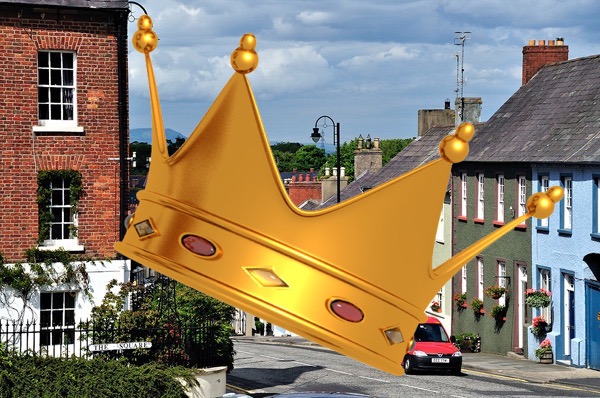
A decision by the London government to rechristen a village in County Down in honour of the English royal family is the newest British humiliation to be directed at the nationalist people of occupied Ireland.
An official decree, known as a Letters Patent, is to be granted later this year which will officially rename Hillsborough, twelve miles to the southwest of Belfast, as ‘Royal Hillsborough’.
The village’s population of some 4,000 people were not consulted on the action, which has been greeted with silence by the Stormont administration and the Dublin government, but the move could have an impact on long-awaited plans to revive the Irish language in the Six Counties.
Boasting of the “fantastic news” and “special honour” for the village to be renamed for the royals, British Direct Rule Minister Brandon Lewis linked the decision to unionist commemorations of the centenary of the partition of Ireland.
Of course, Lewis will be aware that it was partition and the War of Independence which marked the end of royal nomenclature for places in the liberated 26 Counties. Cobh in County Cork, named ‘Queenstown’ in honour of the Famine Queen Victoria, was the first to shed its royal title, followed by Laois (‘Queen’s County’), Offaly (King’s County), Portlaoise (Maryborough), and Dun Laoghaire (‘Kingstown’).
CULTURE WAR
The move is reportedly intended as a sop to unionists who continue to express anger over issues such as Brexit port checks and the police’s handling of the funeral of the late IRA leader Bobby Storey in June last year.
But it is resentment over the possibility that Gaelic speakers could win greater rights to use Ireland’s native language that is said to be at the heart of the latest concession.
The name change was notably not condemned by nationalist politicians, lending weight to suggestions that it is intended to encourage unionists to finally agree to the implementation of legal protections for the Irish language, fifteen years after an Irish language act was first agreed in talks at St Andrews.
The idea of an ‘Acht na Gaeilge’, which would support Irish speakers and provide rights for using Gaelic in public services, continues to terrify hardline unionists. They believe that a publicly visible native language will symbolise the end of British domination in the north of Ireland.
Unionist fears of abandonment by Britain have encouraged constant visits to the Six Counties by members of the English royal family as public demonstrations that London is still in control. The provocative renaming of Hillsborough is in line with that agenda.
Loyalists such as blogger Jamie Bryson have insisted that the Irish language is the driving vehicle by nationalists for attacks on ‘unionist culture’, following the rerouting of loyalist marches away from nationalist areas and the withdrawal of public funding for sectarian ‘Eleventh’ bonfires.
The 2006 St Andrews deal on support for Irish Gaelic was reneged upon by successive British governments until in January 2020, the so-called ‘New Decade, New Approach’ deal promised to introduce the necessary legislation at the Stormont Assembly. However, it was diluted down from the original stand-alone language act to a few amendments to existing legislation which are far less powerful than the protections currently afforded to Celtic languages in Britain.
However, even that was still too much for unionists, and the move was delayed by a further 18 months by the DUP. The introduction of the legislation, which includes protections for Ulster Scots, is still awaited, to the fury of Irish language activists ‘An Dream Dearg’ (the Red Group), who say they are ‘Dearg le Fearg’ (Red with Anger).
STORMONT CRUNCH
Following the removal of DUP leader Arlene Foster by her party, there is now pressure on Sinn Féin to withhold their necessary approval for the nomination of a new First Minister without action for Irish speakers. And in either event, there will be a question mark over the future of the Stormont Assembly.
The position of the new DUP leader Edwin Poots remains contradictory. In his latest comments, Poots claimed this week he wishes to “expedite” the rollout of all outstanding aspects of the deal, but bizarrely tied language legislation to healthcare waiting lists.
He did not specify a timetable, but said he wanted the matter dealt with “in a timely fashion”.
“I am committed to fulfilling all aspects of New Decade, New Approach,” he told BBC Radio.
“I’ve indicated that I will ask my first minister, whoever that happens to be, to expedite all aspects of New Decade, New Approach in a timely fashion and as quickly as possible, and that is my commitment to the people of Northern Ireland,” he said.
Sinn Féin has declined to confirm whether the party will share power with a First Minister nominated by Poots without a substantive move on the language issue.
The party’s Deputy First Minister Michelle O’Neill said Sinn Féin had told Poots in “no uncertain terms around what’s required in order to be back around the table and us all to be able to do business together”, without providing details.
Further talks on the issue are due to take place next week.
“While Edwin Poots’ words are fine, I now want to see action and I want to see delivery, as do the public at large,” Ms O’Neill said.
“The time for bluster and bluff is over. These commitments were made by all political parties, including the DUP – it’s now time to deliver them.
“Whilst I think Edwin Poots’ words are fine, I now expect to see action, I expect to see them delivered upon, and I will hold his feet to the fire on those things.”
![[Irish Republican News]](https://republican-news.org/graphics/title_gifs/rn.gif)
![[Irish Republican News]](https://republican-news.org/graphics/title_gifs/harp.gif)

